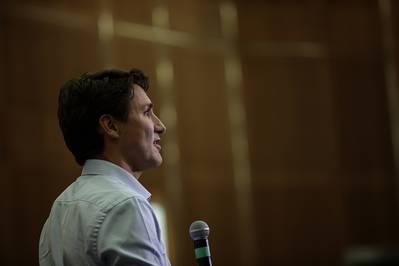Canadian Prime Minister Justin Trudeau on Friday dismissed a recent string of major oil companies selling their holdings in the heavy oil sands of Western Canada and moving investments to shale fields.
Royal Dutch Shell and Marathon Oil (MRO) this week disclosed sales of operations that largely removed both firms from the carbon-heavy oil reserves. Shell is selling its interests to Canadian Natural Resources (CNQ). Last month, Exxon Mobil (XOM) wrote down all of its oil reserves from its Kearl project in northern Alberta, saying extracting the oil was no longer economic at current prices.
"Businesses will make the decisions they make," Trudeau said.
In a wide-ranging media briefing, Trudeau said oil and gas executives are looking for greater clarity on regulations and pricing, arguing that the world is ready for a low-carbon economy. He also said Canada and the United States are working on border issues, including migration and trade.
Trudeau said a Canadian consensus on a carbon price to meet international climate change goals shows the nation can move forward on difficult issues.
"The one thing I’ve heard consistently from leaders in the energy industry is the need for clarity in terms of what (the) frame of regulations, (and) pricing is going to be," he said.
Promoting both renewable and conventional energy sources shows "investments in Canada are sound investments, not just for short term, but for the long term," Trudeau said." We're going to see many people interested in partnering in drawing on Canadians' great natural resources."
Referring to a U.S. proposal for a tax on imports to stimulate job creation, which his government opposes, Trudeau cautioned that details are still lacking, and agreement is far from assured.
"Anything that creates extra barriers and impediments to the smooth flow of goods will hurt our business and hurt our workers and limit our capacity to be competitive," he said, repeating his objections to a U.S. border tax.
Asked about potential repercussions if a tax were imposed, Trudeau said his government would seek to protect the country's export jobs and "stand up for the values we hold dear."
The United States and Canada are engaged at several levels, he said, including on trade, refugees and immigration. The country's minister of public safety is meeting with the U.S. secretary of Homeland Security on border issues, he said, adding that Canada is not skimping on border security.
Work also is continuing on gaining pre-clearance approvals to allow more Canadians to pass U.S. customs reviews while still on Canadian soil, he said, speeding up travel between the two countries.
(Reporting by Liz Hampton; Writing by Gary McWilliams; Editing by Dan Grebler)

